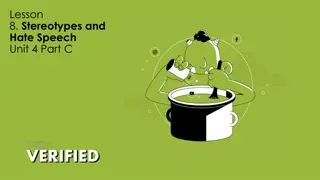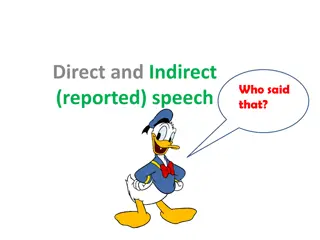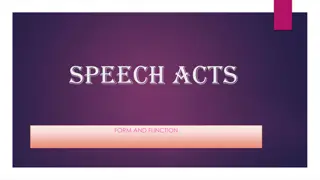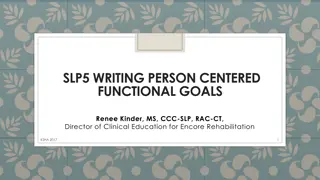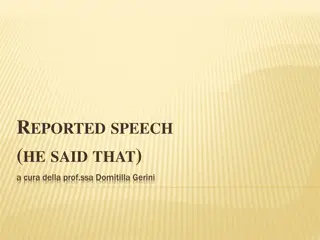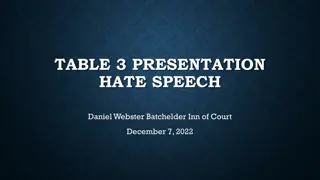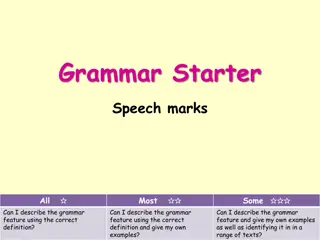Understanding the 8 Parts of Speech in Grammar
Explore the essential components of language with Cornell Notes on the 8 parts of speech in grammar. Discover the roles of nouns, pronouns, verbs, adjectives, adverbs, prepositions, interjections, and conjunctions. Expand your knowledge on grammar levels, common and proper nouns, possessive pronouns, adjectives, and more. Enhance your understanding of how words function within sentences and the nuances of language structure.
Download Presentation

Please find below an Image/Link to download the presentation.
The content on the website is provided AS IS for your information and personal use only. It may not be sold, licensed, or shared on other websites without obtaining consent from the author. Download presentation by click this link. If you encounter any issues during the download, it is possible that the publisher has removed the file from their server.
E N D
Presentation Transcript
Cornell Notes: 8 Parts of Speech Main Idea/Question Noun: A word that names a person, place, thing or idea Notes Pronoun: A word used in place of noun Verbs: A word that shows action, being, or links a subject to a subject complement Adjective: A word that modifies, or describes a noun or a pronoun Adverb: A word that modifies, or describes a noun or pronoun Preposition: A word that shows a relationship between its object and another word in the sentence Interjection: A word that shows emotion but has no grammatical function Conjunctions: A word that joins two words or two groups of words
Cornell Notes: Grammar Main Idea/Question Notes What is Grammar? The way we think about language. How many levels are there? 4 What is the First Level? Parts of Speech How many parts of speech are there? 8 different parts of speech
Cornell Notes: Nouns Notes A general name for a person, place, thing or idea. mountain Name of a particular person, place thing or idea. Main Idea/Question Common Nouns student Proper Nouns Mount Whitney Names a group of people or things ex. Pack, team, jury Megan Collective Noun Singular/Plural Possessive Noun Compound Noun One/More than one Shows ownership s or s APOSTROPHE 2 or more words used together as 1 noun ex. Toothbrush, runner-up, dining room
Cornell Notes: Pronouns Notes a word used in place of a noun or another pronoun. Possessive pronouns: used to show ownership or relationship ex. Her, his, ours, theirs *NO APOSTROPHE Subject pronouns: used as the subject of a sentence ex. I, you, he, she, it we, you, they Object pronouns: used as the object of the verb or a preposition, or used as a direct object or indirect object. ex. Me, you, him, her, it, us, you, them Demonstrative pronouns: points out a person, place, thing or idea without naming that person, place thing or idea. ex. This, that, these, those Interrogative pronouns: Introduces a question ex. Which, who, whom, what, whose Main Idea/Question Pronouns:
Cornell Notes: Adjectives Main Idea/Question Adjectives A word that modifies a noun or pronoun Adjectives help you see and/or feel Notes Articles considered adjectives-a, an, the Proper adjectives are formed from proper nouns and are always capitalized ex. China- Chinese Mars- Martian Subject compliment an adjective that is behind a linking verb and tells more about the subject (predicate adjective)
Cornell Notes: Direct & Indirect Object Main Idea/Question Direct Object (DO) A noun or object pronoun that receives the action of the action verb. Indirect Object (IO) A noun or object pronoun that is indirectly affected by the action verb. The IO is located between the action verb and the direct object Notes The producer paid us rent money 1. Find the main action verb---Paid 3 steps to find DO/IO 2. To find DO, ask- paid what?--money 3. To find the IO, ask- paid to or for whom or what?---us
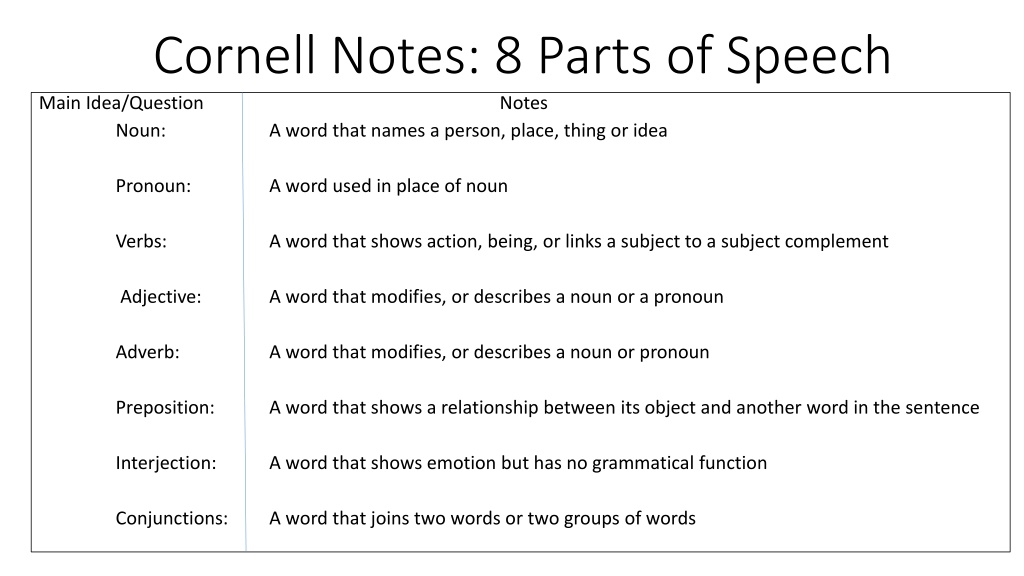

![Prevention and Combating of Hate Crimes and Hate Speech Bill [B.9B.2018]](/thumb/60513/prevention-and-combating-of-hate-crimes-and-hate-speech-bill-b-9b-2018.jpg)

